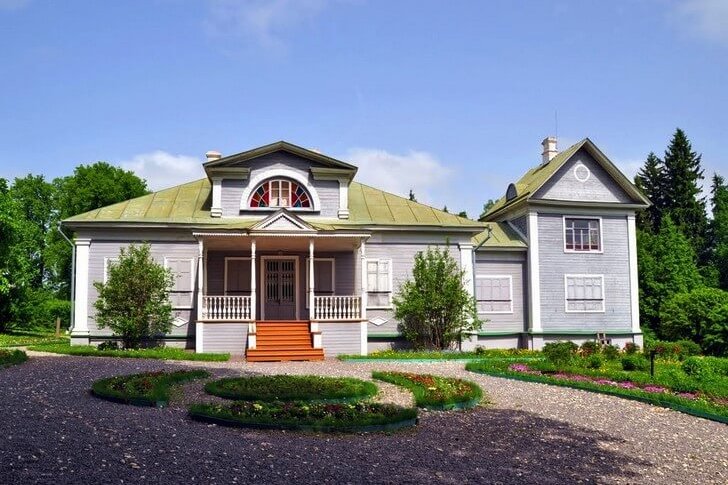The city of Klin near Moscow began its history in the 14th century. The Assumption Church is considered the earliest architectural monument that has survived to this day. Later buildings of the 18th-19th centuries are also of historical value. - Postal yard, Resurrection Church, Mayor's House, shopping arcade, Cathedral complex, shop under the clock.
The names of many famous figures of science and art are associated with Klin. Among them are A. Radishchev, P. Tchaikovsky, S. Taneev, A. Beketov, A. Blok, D. Mendeleev, A. Gaidar. Noble estates in the vicinity of the city - Shakhmatovo, Boblovo, Demyanovo - are of interest not only as an example of suburban architecture of the past centuries, but also because famous people of Russia lived in them.
And the youngest tourists will like an excursion to a real Christmas fairy tale - a unique museum of Christmas decorations.
What to see and where to go in Klin?
The most interesting and beautiful places for walking. Photos and a short description.
- House-Museum of P. I. Tchaikovsky
- Trading rows
- Fountain Girl mushroom
- Christmas Tree Toy Museum
- Monuments to P. I. Tchaikovsky
- Trinity Cathedral Complex
- Assumption Church
- House-Museum of A.P. Gaidar
- Shop under the clock
- Memorial of Military Glory
- Manor Demyanovo
- Museum-estate of D. I. Mendeleev Boblovo
- The estate of captain I. V. Tarakanov
- Monument to A. Blok and L. Mendeleeva
- Manor Shakhmatovo
House-Museum of P. I. Tchaikovsky
The museum complex includes the house where the composer spent the last year and a half of his life, an old park and the Demyanovo estate, where Tchaikovsky visited his student S. Taneyev. The original furnishings of several rooms that the maestro occupied and the objects he touched have been preserved in the house. The main exhibit is the piano, which today the laureates of the Tchaikovsky Competition have the right to play. Nearby is a concert hall where great works are often performed.
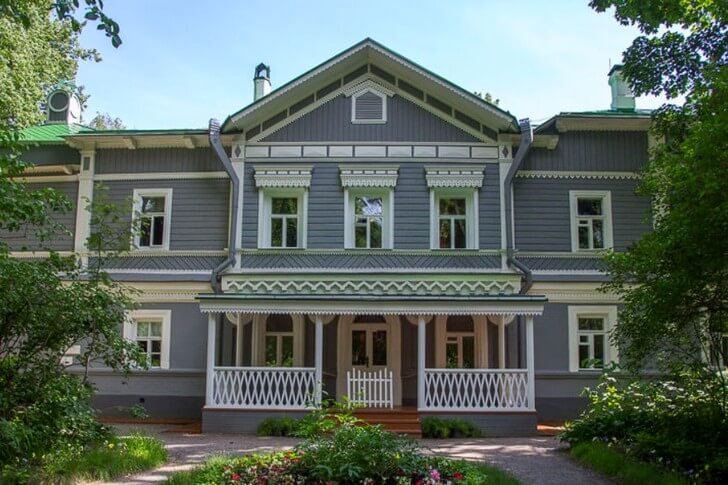
Trading rows
A large complex of two-story stone structures in the pseudo-Russian style. It was erected in the 80s of the XIX century on the site of burnt wooden rows. The first floor was occupied by various shops, the second - by the offices of their owners. In the patterned arch between the rows, there is an icon of the patron saint of merchants - Nikolai Ugodnik. In Soviet times, the buildings were almost never used. Today they have been restored, shops, cafes, business and entertainment establishments have reopened here.
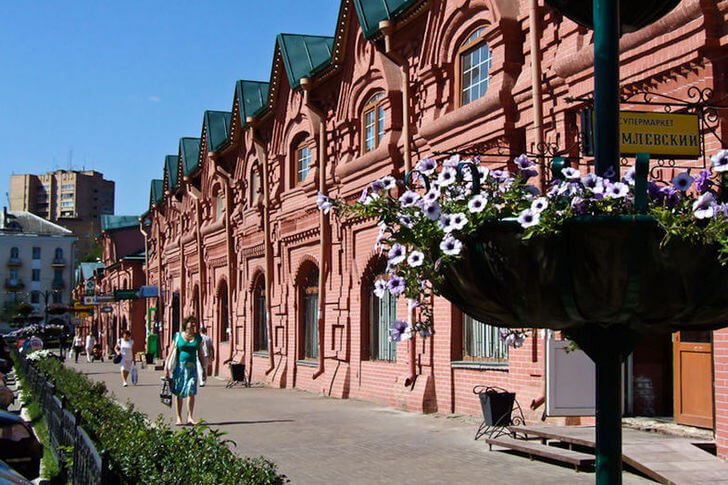
Fountain "Girl mushroom"
At the end of the 19th century, a 100-kilogram sculpture of a girl was cast at one of the Ural factories for a private estate in Zolino. During the years of the revolution, it ended up at the bottom of a reservoir, where it was later discovered and installed in the city center. The locals gave her a name - Alyonushka. After an unsuccessful attempt to steal the statue and sell it for scrap, it was moved to the museum for storage. And the fountain on the central square today is decorated with a skillfully made copy of the monument.
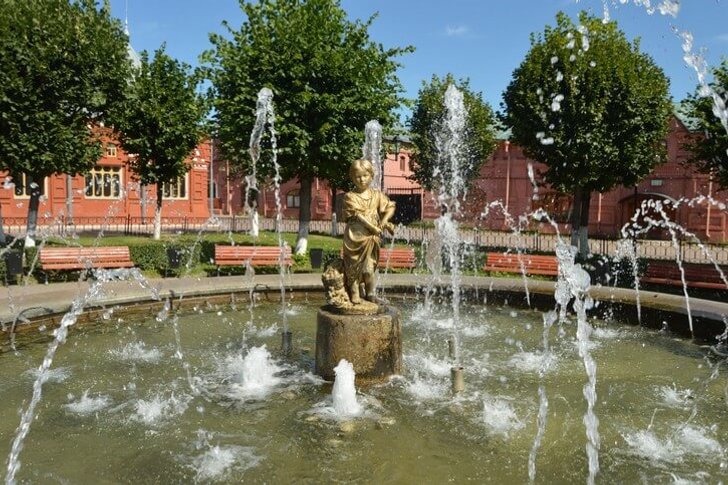
Christmas Tree Toy Museum
The unique museum is open at the factory of Christmas decorations - the oldest glass-blowing company in the country. It consists of 12 exhibition halls dedicated to certain periods in the history of the creation of Christmas decorations. Here you can see a Christmas tree decorated according to the traditions of the 19th century, the workplace of a glass blower, the Nutcracker Hall with a Christmas tree, Soviet toys and modern products of the plant. Visitors are invited to the glass-blowing shop of the factory, and then to the toy-painting shop.
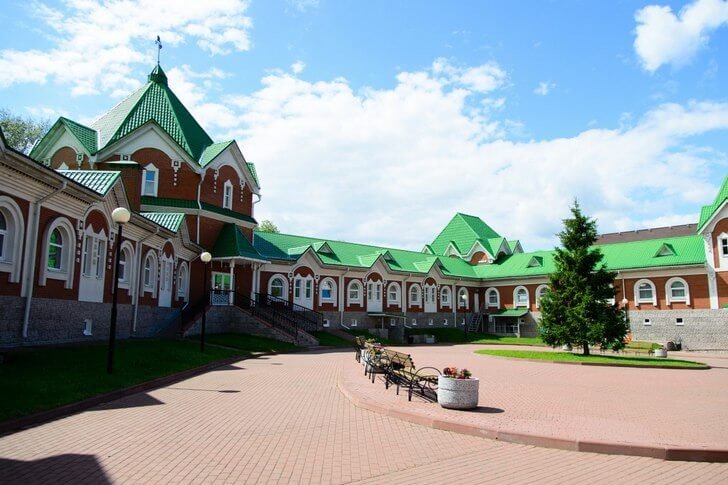
Monuments to P. I. Tchaikovsky
In the city you can see 3 monuments to the famous composer. One of them was installed in 1995 opposite the building of the former Trinity Cathedral. The sculptor depicted Tchaikovsky standing in deep thought and looking into the distance. The second monument was opened in 2006 next to the composer's museum. Tchaikovsky is depicted sitting on a bench with a notebook in his hand. And the third monument, or rather the bust of the composer, is installed near the railway station, between the platforms. Its author is Vera Mukhina.
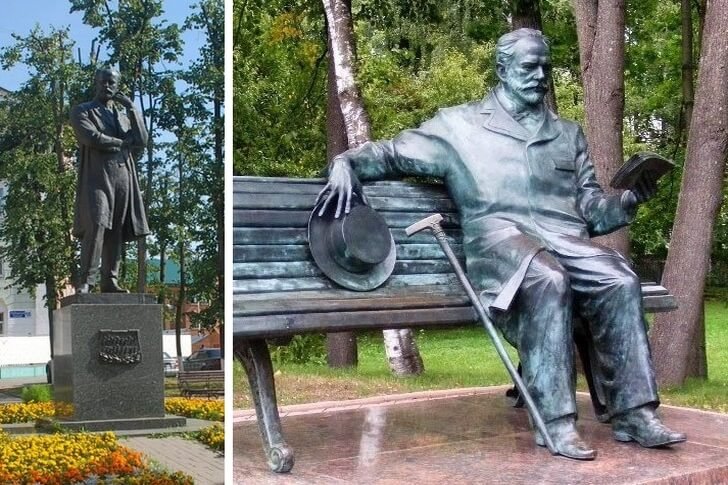
Trinity Cathedral Complex
A brilliant Orthodox ensemble of several buildings in the city center was created in the XVIII-XIX centuries. It consists of the Trinity Cathedral, the bell tower, the cathedral hotel and the Resurrection Church. During the years of Soviet power, all buildings were rebuilt beyond recognition and used for household needs. In the 1990s, only the bell tower was restored; a small functioning church was located in its lower tier. There are plans to restore the entire complex.
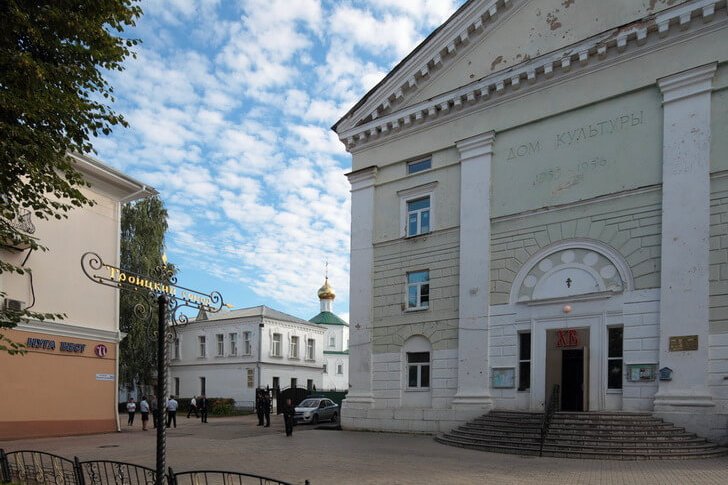
Assumption Church
A small single-domed white stone building. It was erected in the middle of the 16th century at the monastery of the same name in memory of the victims of the guardsmen of Ivan the Terrible. Two centuries later, the monastery was abolished, but the church remained. Subsequently, the bell tower and the refectory were completed, porticos appeared on the facades. During the Soviet period, the bell tower was blown up, the building housed warehouses and a hostel. In the 90s, the temple was restored, a new belfry was built and returned to the Orthodox.
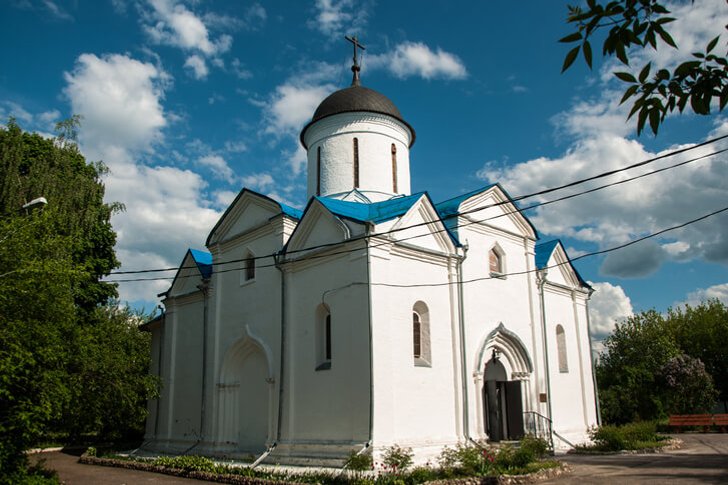
House-Museum of A.P. Gaidar
In this one-story wooden house on one of the ancient streets of Klin, the writer spent the last few years of his life, from 1938 to 1941. The museum opened in 1989. His collection consists of many personal belongings of the writer, which, like the rest of the furnishings in the house, were preserved by his wife. The museum conducts themed tours, screen versions of Gaidar's works, and various literary events, including those for children.
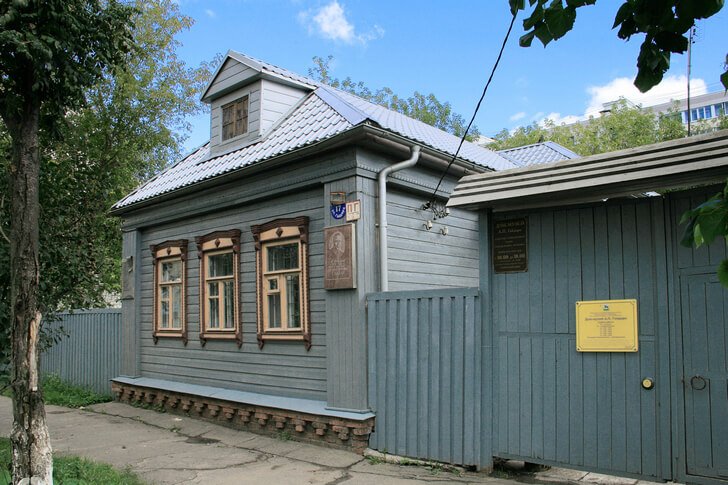
"Shop under the clock"
Two-story corner house of the 19th century, above which rises a small clock tower. Moreover, the clock was installed later, in 1924, and at that time it was the only one in the city. Before the revolution, the building housed a teahouse and a tavern. In the 1930s, the department store Torgsin. In the post-war period, the house was redesigned for communal apartments. Since the end of the 1970s, the second floor has been occupied by the town planning department, and today a grocery store has been opened on the first floor.
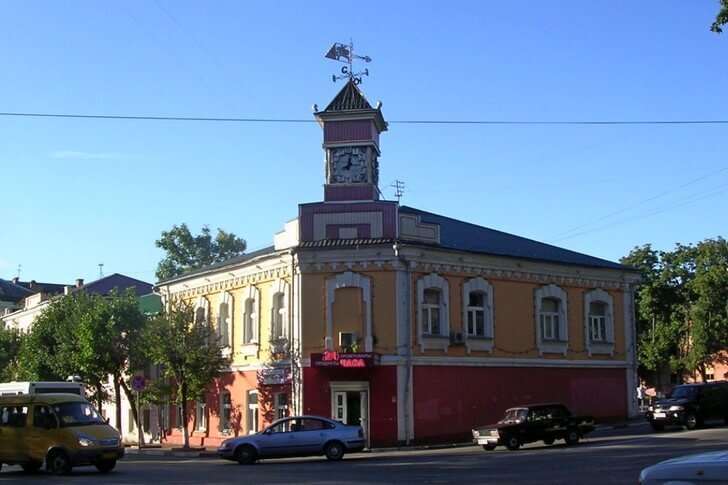
Memorial of Military Glory
Established in 1995 in Pervomaisky Square, at the military memorial cemetery, consisting of one common and 60 individual graves. The main composition is represented by the figure of a wounded soldier, who is held in the arms of a soldier and a nurse. The memorial includes a monument to the Heroes of the Soviet Union, an Eternal Flame, a large granite stele with a screen broadcasting a list of those who did not return from the WWII fronts, as well as a monument to the Klin residents who died in local wars.
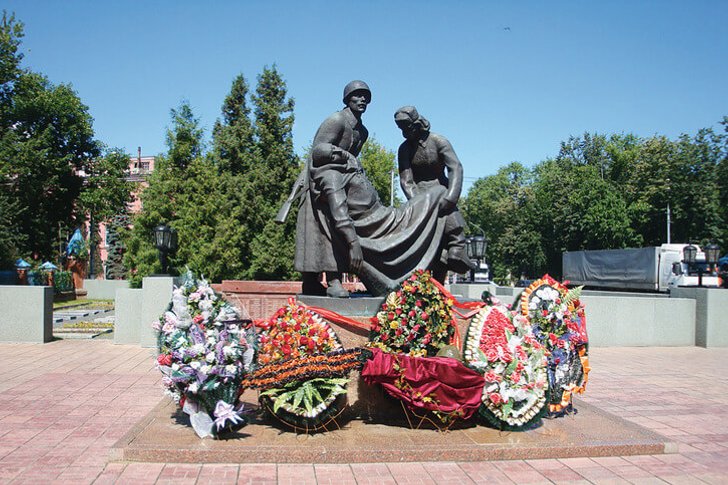
Manor Demyanovo
Manor complex in the style of classicism. It was erected in the middle of the 18th century, it consisted of the main two-story mansion and outbuildings. Pushkin, Derzhavin, Tchaikovsky, Vasnetsov, Catherine II, Alexander I visited here at different times. In 1746, the Assumption Church was built at the expense of the owner of the Naumov estate. Today it has been restored and is open to the public. Only ruins remained of the estate itself. In the 90s, it was transferred to the Tchaikovsky Museum.
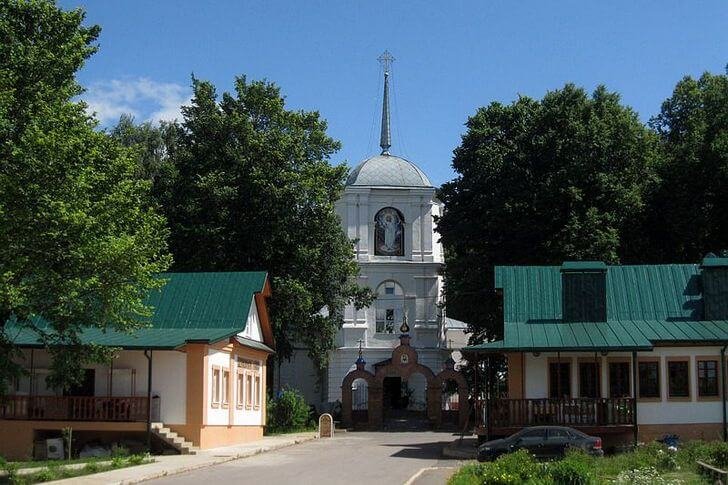
Museum-estate of D. I. Mendeleev "Boblovo"
The estate in the village of Boblovo, near the Lutosnya River, was acquired by a famous scientist in 1865. Here he liked to spend the summer months, continuing to engage in scientific activities. A stone one-story house surrounded by a landscaped park and buildings that survived the fire has survived to this day. The museum on the estate opened in 1987. It includes 3 exhibition halls, where photographs, archival documents, a library, personal belongings of D. Mendeleev are presented.
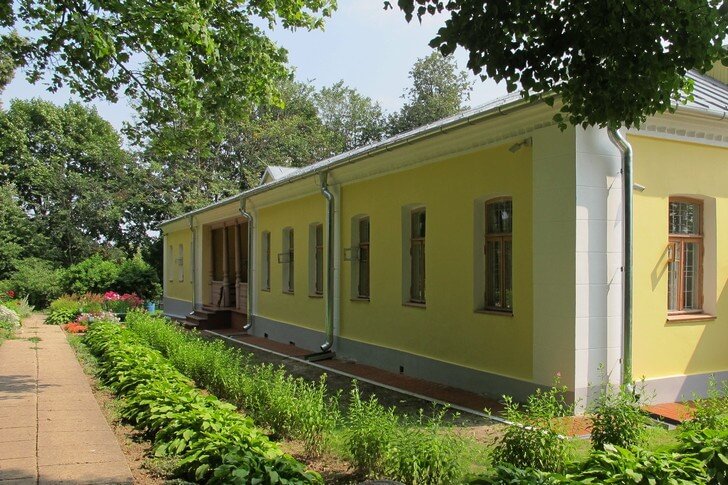
The estate of captain I. V. Tarakanov
It is part of the museum complex-reserve of D. Mendeleev and A. Blok. Known since the 17th century. It got its name from the name of the owner. In 1777, under I. Tarakanov, a church was erected. It was in it that A. Beketov, the grandfather of A. Blok, was buried in 1902, and later the poet married his wife here. In the 19th century, a zemstvo school was built, where the A. Blok Museum is currently located. Folklore holidays, excursions, master classes are held in the estate.
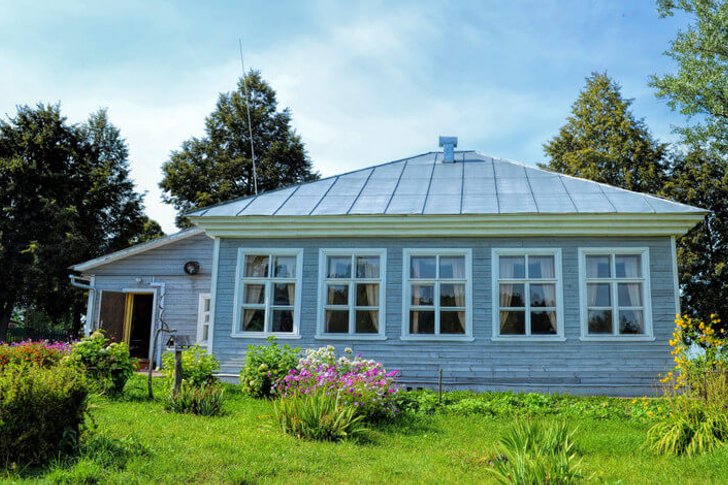
Monument to A. Blok and L. Mendeleeva
The sculptural composition was installed in 2008 in the Tarakanovo estate, 2 kilometers from the family estate of A. Blok. Nearby is the church where in 1903 the poet married Lyubov Mendeleeva. The author of the monument was the famous modern sculptor Alexander Rozhnikov. He depicted the poet in a kosovorotka and boots, and his wife in a Russian sundress and shawl. According to contemporaries, the couple liked to wear just such simple clothes when they came to the village.
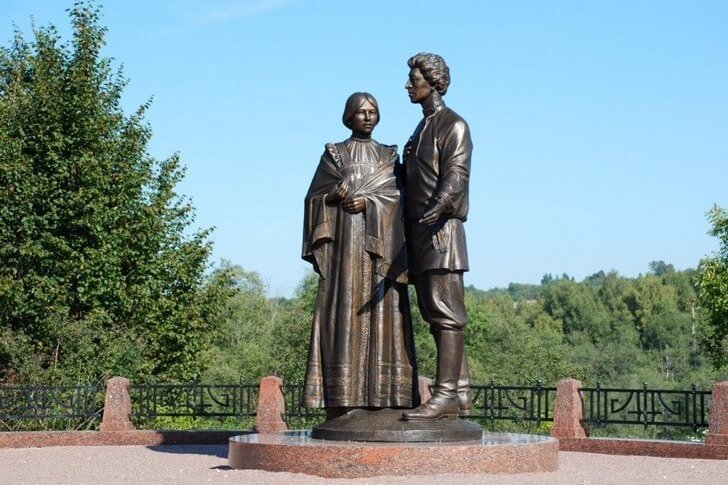
Manor Shakhmatovo
The noble estate in the valley of the Lutosnia River was acquired by A. Beketov in 1874. Every summer, since childhood, A. Blok visited his grandfather. It was here that he wrote about 300 poems, and in the neighboring estate he met his future wife. Since 1984, the estate has been part of the museum complex of A. Blok and D. Mendeleev. The interior of 10 rooms of the house has been recreated, among the exhibits are pieces of furniture, books with autographs, personal items, letters and photographs of the poet.
